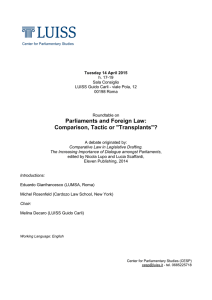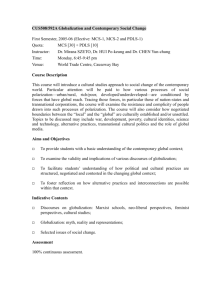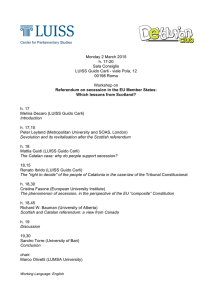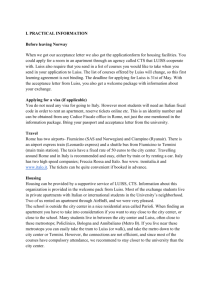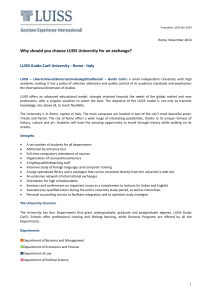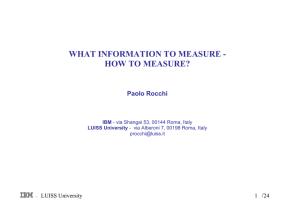LUISS – Upenn Exchange Program
advertisement
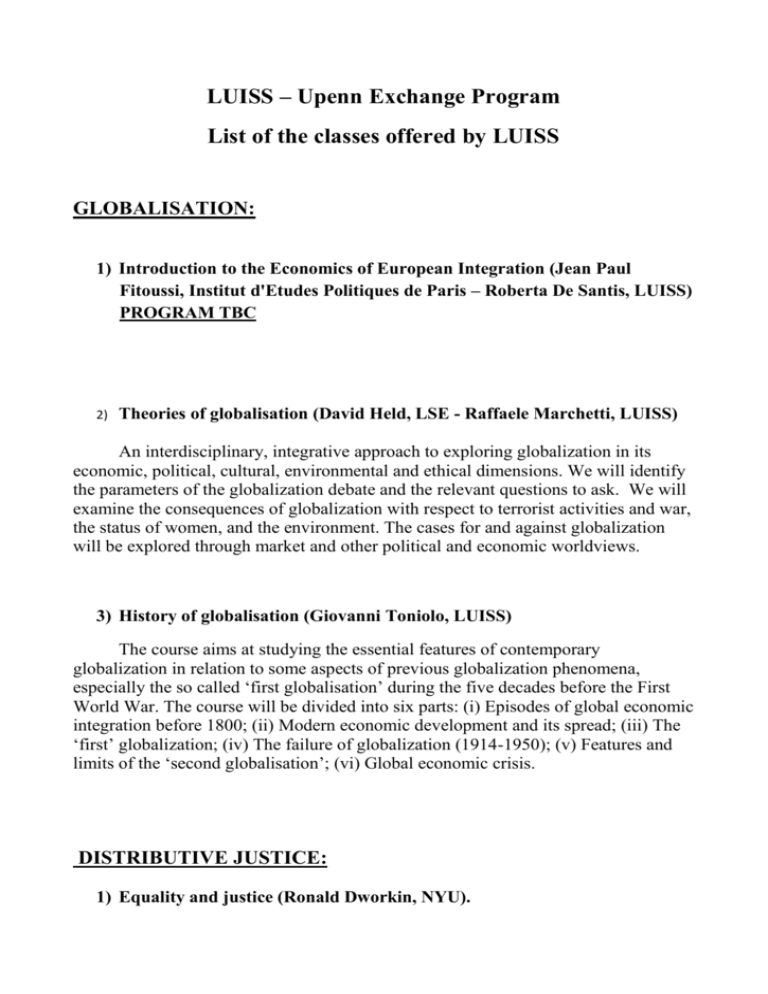
LUISS – Upenn Exchange Program List of the classes offered by LUISS GLOBALISATION: 1) Introduction to the Economics of European Integration (Jean Paul Fitoussi, Institut d'Etudes Politiques de Paris – Roberta De Santis, LUISS) PROGRAM TBC 2) Theories of globalisation (David Held, LSE - Raffaele Marchetti, LUISS) An interdisciplinary, integrative approach to exploring globalization in its economic, political, cultural, environmental and ethical dimensions. We will identify the parameters of the globalization debate and the relevant questions to ask. We will examine the consequences of globalization with respect to terrorist activities and war, the status of women, and the environment. The cases for and against globalization will be explored through market and other political and economic worldviews. 3) History of globalisation (Giovanni Toniolo, LUISS) The course aims at studying the essential features of contemporary globalization in relation to some aspects of previous globalization phenomena, especially the so called ‘first globalisation’ during the five decades before the First World War. The course will be divided into six parts: (i) Episodes of global economic integration before 1800; (ii) Modern economic development and its spread; (iii) The ‘first’ globalization; (iv) The failure of globalization (1914-1950); (v) Features and limits of the ‘second globalisation’; (vi) Global economic crisis. DISTRIBUTIVE JUSTICE: 1) Equality and justice (Ronald Dworkin, NYU). The course will explore the foundations of the egalitarian thought and will explain the sense in which equality is the sovereign virtue of political community. Human rights, taxes and social justice, religious pluralism will be among the issues discussed in the light of the tenets of a political morality that assumes equality of concern and respect as its leading values. 2) Global justice (Sebastiano Maffettone, LUISS) The course aims at introducing students to the contemporary philosophical debate on global justice with a special emphasis on philosophical attempts to extend theories of domestic distributive justice to the global arena. An extensive discussion on John Rawls’ The Law of Peoples will show the theoretical difficulties involved in such an effort. This will pave the way to a reflection on the limits of cosmopolitan perspectives. 3) Theories of equality (Ian Carter, University of Pavia) The course will introduce the contemporary debate on distributive justice and focus on the most relevant contemporary theories of equality. Among the topics that will be discussed are: John Rawls’s difference principle; Libertarian critiques of egalitarianism and the theory of “left-libertarianism”; Equality and responsibility: Luck egalitarians and their critics; The value and basis of equality; Equality of Resources; Compatibility between equality and self-ownership; Luck egalitarianism and respect for people. CHOICE AND BEHAVIOR: 1) Behavioral Economics and Game Theory (Massimo Egidi, LUISS) The course will focus on the following topics: The main experimental results underpinning ‘Behavioral Economics’ and the violations of the expected utility theory; Review of experimental evidence of the Allais paradox until the ‘framing effect’; Discussion of alternative theories to EUT, with a special focus on Regret Theory and Prospect Theory; Uncertainty and risk: Ellsberg paradox; Decision errors within organizations and decision errors within teams; The Target the Two game: experimentation, statistical data analysis, and simulations; Dual model of reasoning; Behavioral Finance: experiments and discussion of applications to finance. 2) Social norms (Cristina Bicchieri, UPENN – Giacomo Sillari, UPENN) PROGRAM TBC 3) Theories of responsibility (Daniele Santoro, LUISS) The course addresses different aspects that responsibility bears on human agency under three different profiles: morality, the law, and the domain of social institutions. The course is articulated in four parts. Part I will introduce to the relation between responsibility and free will. Part II will focus on responsibility as a source of moral blame. Part III will draw attention to cases of responsibility in the law. The final part will address cases of collective and institutional responsibility. 4) Law and economics (Marco Sepe, LUISS) PROGRAM TBC
